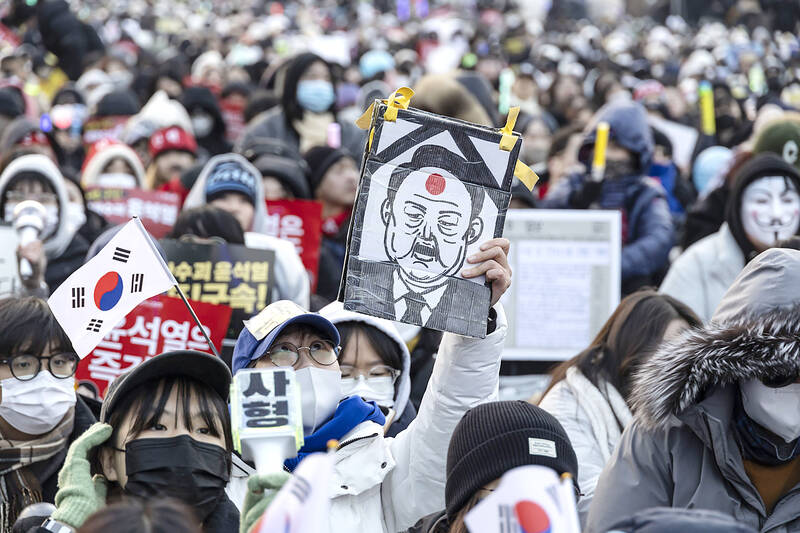South Korea’s consumer confidence this month dropped by the most since the outbreak of the COVID-19 pandemic, battered by the political turmoil triggered by President Yoon Suk-yeol’s declaration of martial law and his impeachment.
The composite consumer sentiment index slipped 12.3 points to 88.4 this month, falling well below the threshold of 100 that divides optimism and pessimism, a Bank of Korea (BOK) survey released yesterday showed.
That is the biggest slide since the WHO declared the pandemic in March 2020, sending global consumer sentiment tanking.

Photo:Bloomberg
Yoon declared martial law on Dec. 3 in a move that rattled financial markets from stocks to currencies, prompting the BOK and government to pledge “unlimited liquidity” if necessary.
Greater political uncertainty and financial volatility are the main factors that dented confidence among South Koreans, the BOK said in the survey conducted from Dec. 10 to Tuesday last week.
While Yoon retracted his decree within hours, parliament punished him on Dec. 14 by approving an impeachment motion that the South Korean Constitutional Court would deliberate. Yoon remains suspended from power, with South Korean Prime Minister Han Duck-soo serving as his stand-in.
The latest survey shows how the events have impacted consumer sentiment, raising concerns about a further slowdown in private spending.
Sentiment about the economy plunged 18 points from a month earlier while the outlook for the next half year dropped by the same margin, the survey showed.
The outlook for consumer spending dipped 7 points while the prospect for home prices fell 6 points.
Speculation is increasing among economists that the BOK might consider a rate cut next month to respond to the headwinds rising for the economy as the political uncertainty rumbles on.
The bank conducted back-to-back cuts in October and last month as it sought to brace the export-reliant economy for the potential impact of US president-elect Donald Trump’s return to power and his tariff plans.

Taiwan Semiconductor Manufacturing Co (TSMC, 台積電) yesterday said that its investment plan in Arizona is going according to schedule, following a local media report claiming that the company is planning to break ground on its third wafer fab in the US in June. In a statement, TSMC said it does not comment on market speculation, but that its investments in Arizona are proceeding well. TSMC is investing more than US$65 billion in Arizona to build three advanced wafer fabs. The first one has started production using the 4-nanometer (nm) process, while the second one would start mass production using the

When an apartment comes up for rent in Germany’s big cities, hundreds of prospective tenants often queue down the street to view it, but the acute shortage of affordable housing is getting scant attention ahead of today’s snap general election. “Housing is one of the main problems for people, but nobody talks about it, nobody takes it seriously,” said Andreas Ibel, president of Build Europe, an association representing housing developers. Migration and the sluggish economy top the list of voters’ concerns, but analysts say housing policy fails to break through as returns on investment take time to register, making the

‘SILVER LINING’: Although the news caused TSMC to fall on the local market, an analyst said that as tariffs are not set to go into effect until April, there is still time for negotiations US President Donald Trump on Tuesday said that he would likely impose tariffs on semiconductor, automobile and pharmaceutical imports of about 25 percent, with an announcement coming as soon as April 2 in a move that would represent a dramatic widening of the US leader’s trade war. “I probably will tell you that on April 2, but it’ll be in the neighborhood of 25 percent,” Trump told reporters at his Mar-a-Lago club when asked about his plan for auto tariffs. Asked about similar levies on pharmaceutical drugs and semiconductors, the president said that “it’ll be 25 percent and higher, and it’ll

CHIP BOOM: Revenue for the semiconductor industry is set to reach US$1 trillion by 2032, opening up opportunities for the chip pacakging and testing company, it said ASE Technology Holding Co (日月光投控), the world’s largest provider of outsourced semiconductor assembly and test (OSAT) services, yesterday launched a new advanced manufacturing facility in Penang, Malaysia, aiming to meet growing demand for emerging technologies such as generative artificial intelligence (AI) applications. The US$300 million facility is a critical step in expanding ASE’s global footprint, offering an alternative for customers from the US, Europe, Japan, South Korea and China to assemble and test chips outside of Taiwan amid efforts to diversify supply chains. The plant, the company’s fifth in Malaysia, is part of a strategic expansion plan that would more than triple